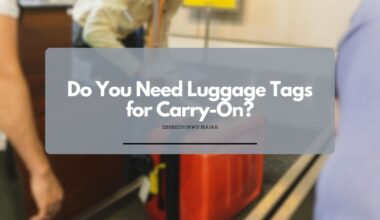As an Amazon Associate, I earn a small commission from qualifying purchases. Learn more about this.
If you’re planning a domestic flight, you might be wondering whether or not you can lock your luggage.
While the right answer to this question would vary based on some factor or conditions, this article should provide the needed information to easily make your decision.
Can I Lock My Luggage On a Domestic Flight?
Firstly, it’s generally expected that you lock your luggage on domestic flights just as you’d normally do on international flights.
This is most likely yes than never unless you’re not putting any valuable items in it.
And if you’re wondering whether it’s permitted, it is. You’re permitted to do this, without violating any legal rules.
For any airport that won’t permit locks, they’ll likely let you know upfront.
And in most cases, the alternative would be to opt into a TSA-approved lock for countries that use this.
This is simply a way of saying you should get locks that can be opened by TSA agents if they need to inspect your bag.
The TSA Rule
When you travel by plane within the United States, or even to a few other countries that work with the U.S., there’s a special rule about your luggage locks that you need to know.
This rule comes from the Transportation Security Administration, commonly known as the TSA. The official agency behind security at airports in the U.S.
Here’s the main point: You are allowed to lock your bags, but only with a special kind of lock.
These locks are called TSA-approved locks.
The reason for this is quite straightforward.
Sometimes, for safety reasons, TSA officers need to check inside your bags before they go on the plane.
If they come across a bag with a lock they can’t open, they have no choice but to cut it off. That’s not something any of us want.
TSA-approved locks are different because they have a special design.
They can be opened by TSA officers using a master key.
This means that if they need to check your bag, they can open the lock, do their check, and then lock it back up. Your belongings stay safe, and your lock remains intact.
Editors note: When traveling across a TSA-employed location like the US, TSA locks are actually to your advantage, as they allow TSA officers to access your luggage for security screenings without having to damage or cut the lock. Could be a good damage-prevention technique.
It’s important to remember that this TSA rule mainly applies to flights within the U.S. and a few other countries that follow similar procedures.
If you’re flying somewhere else, the rules might be different. In those cases, the local airport security rules will apply.
How to Properly Lock Luggage
1. Choose the Right Lock:
Start by picking a TSA-approved lock.
These locks are made for travel, especially in the U.S.
They have a special symbol – a red diamond – which means TSA agents can open them without damaging your lock or bag. You can find these locks in most places where travel accessories are sold.
2. Secure All Zippers:
Most suitcases have zipper pulls that you can lock together.
Make sure you pull all the zippers closed and loop the lock through the holes in the zipper pulls.
This is a simple step, but it’s crucial. It ensures that no one can open your bag without unlocking it first.
3. Don’t Forget the Compartments
If your bag has multiple compartments, don’t just lock the main one.
Make sure all compartments that can be locked are secured. This way, every part of your luggage is protected.
Forgetting to lock your luggage is a mistake you don’t want to be making.
4. Double-Check Before Leaving
Once you’ve locked your suitcase, give it a quick once-over.
Pull on the lock and zippers to make sure they’re properly secured.
It’s better to find out before you leave for the airport than to discover a problem when you’re there.
5. Keep a Spare Key or Combination Note:
If you’re using a key lock, carry a spare key in your carry-on or wallet – just in case you lose the original.
For combination locks, remember the code or keep a note in a secure place, like your phone.
Conclusion
Generally, it’s advised that you lock your luggage for protection and personal privacy.
You don’t want any one getting access to your belongings.
But when doing this, make sure to use a TSA approved lock, to avoid your lock from getting damaged.







